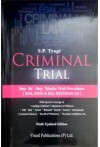- Author(s): S.P. Tyagi, Yogesh V Nayyar
- Publisher: Vinod Publications (P) Ltd.
- Edition: 9 Ed 2025
- ISBN 13 9789395939164
- Approx. Pages 2252 + Contents
- Format Hardbound
- Approx. Product Size 24 x 18 cms
- Delivery Time 3-5 working days (within Kerala & South India) (Others 7-9 days)
- Shipping Charge Extra (see Shopping Cart)
.........................................................................................................................
Description
Criminal Trial is procedural; however; is incomplete in absence of compliance of the set of rules envisaged under the Code of Criminal Procedure, 1973 which postulates apprehending a culprit and bringing him to justice for the wrong done disturbing and causing breach of peace of society. Every act has to be conscious enough to be done and performed by a person and judiciously dealt with by the Courts and for which the Constitution of India, 1950 has its own pragmatic importance where from the judiciary and the judicial system comes into being. Where an act is to be punished, every accused is envisaged with a right and protection under the Constitution of India, 1950 and so as well under the Code of criminal procedure, 1973, it being substantive law.Anant Thanur Karmuse v. State of Maharashtra, 2023 5 SCC 802; 2023 2 SCC(Cri) 568; 2023 2 Supreme 406; wherein the Supreme Court has observed that; "To say that a fair and just investigation would lead to the conclusion that the police retain the power, subject, of course, to the Magistrate's nod under Section 173(8) to further investigate an offence till charges are framed, but that the supervisory jurisdiction of the Magistrate suddenly ceases midway through the pre-trial proceedings, would amount to a travesty of justice, as certain cases may cry out for further investigation so that an innocent person is not wrongly arraigned as an accused or that a prima facie guilty person is not so left out". It's of grave importance to understand the linkage of criminal justice system which operates by virtue of Criminal Procedure Code, 1973; deducing and bringing forth the true facts and incidences in the form of evidence; deposing through witnesses in the form of medical evidence, direct, indirect or circumstantial evidence, thus proving the facts on the basis of presumptions laid under the Indian Evidence Act, 1872; proving the commission of an offence and thus punishing the guilty.
.........................................................................................................................
Contents
1. Introductory and Preliminary
2. Basic Rights and Privileges of an Accused in a Criminal Trial
3. Law Relating to Terms "Trial" and Cognizance"
4. Importance of Arrest, Investigation and "Search and Seizure" provisions in "Criminal Trial"
5. Constitution and Powers of Criminal Courts
6. Trial of Juvenile Offenders
7. Practice and Procedure of Summons and Summary Trial
8. Trial of Police Challan Warrant Cases by Magistrates
9. Practice and Procedure of Trial of Complaint Cases
10. Sessions Trial - Practice and Procedure
11. Hearing on the Question of Sentence and Imposition of Sentence including Death Sentence
12. Role of F.I.R. Motive and Res Gestae in Criminal Trial
13. Direct and Circumstantial Evidence
14. Dying Declaration
15. Identification of Accused and Property
16. Examination of Accused under Section 313 Code of Criminal Procedure
17. Admissions Confessions and Recovery under Section 27 Evidence Act
18. Principles of Appreciation of Prosecution and Defence Evidence and Conduct of Accused
19. Appreciation of Evidence of Various Types of Witnesses
20. Final Report and Protest Petition
21. Law of Limitation in Criminal Trials
22. Principles of Disposal of Property
23. Interlocutory Orders
24. Law of Sanction
25. Provisions of Bail and Bail Bonds
26. Quashing of Proceedings
27. The Protection of Women from Domestic Violence, Act, 2005
28. Plea of Bargaining and its Impact on Criminal Justice Delivery System
.........................................................................................................................
Author Details
S.P. Tyagi
Revised by
Yogesh v Nayyar

